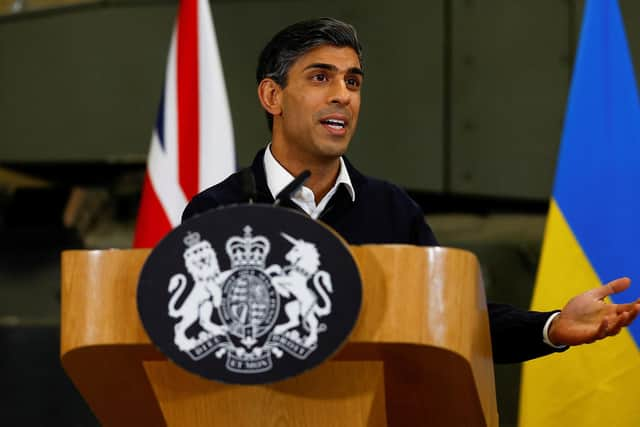Britain's economic woes cannot just be attributed to the war in Ukraine - David Blunkett
Of course, both major events have had a substantial impact. But they've had an impact – in varying degrees – everywhere else in the world.
50 weeks ago, when the Russians invaded Ukraine, there was going to be an additional hike in energy bills, particularly for those countries that were heavily dependent on Russian oil and gas. We were not one of them.
Advertisement
Hide AdAdvertisement
Hide AdNaturally, when world prices go up, so do the prices we have to pay on global markets. Hence, we, too, take a hit. But we also produce oil and gas, albeit that our storage and forward planning has been abysmal, and our energy market is, to say the least, dysfunctional.


Again, we were bound to be affected by the impact of grain exports from Ukraine – the breadbasket of Europe. Despite most of our grain coming from North America, once again, world prices were affected.
Yet, what might we ask ourselves about the impact of those global hikes, and the impact they've had on inflation?
Well, if you take the energy market, you can clearly see who the beneficiaries and losers have been. The losers have clearly been all those this winter who have been struggling to make ends meet, and to heat their homes during the January freeze – many keeping the heating off as long as possible and coming close to hypothermia.
Advertisement
Hide AdAdvertisement
Hide AdBritish Gas, owned by Centrica, were found, 10 days ago, to have been getting magistrates to sign off on contractors forcibly installing prepayment meters by breaking into the houses of many vulnerable children and adults.
Sadly, British Gas are not the only culprits in this bizarre saga.
We know who has benefited. Because in the same week as that revelation, Shell announced a profit for last year of a staggering £32bn. Yes, billion. Like Centrica – who are predicting a substantial increase in their profits – they own local energy providers. Local providers are not the ones making a profit but are the interface between those who are raking it in and the customer.
In between, there is the National Grid for electricity, and companies responsible for the infrastructure, power lines and pylons. The whole system is frankly a total mess.
Advertisement
Hide AdAdvertisement
Hide AdSo, back to whether poor old Britain is somehow suffering more than anywhere else, and it's all down to someone else.
Time to ask, surely, a few hard questions about our current inflation level, and what the equivalent is in other countries.
To ask why prices have shot up in goods and materials which are not affected by global transport costs, the war in Ukraine or, for that matter, somehow, the aftermath of the pandemic.
Tongue-in-cheek, I have been wondering why British lamb has shot up in price. Presumably not because we have taken to importing Ukrainian grass? Fuel costs can't explain a fraction of the hike in crucial foodstuffs, which, as we will see later, are not replicated everywhere else in the world.
Advertisement
Hide AdAdvertisement
Hide AdSomeone, somewhere, is making a killing, and they are doing so at our expense. Just as in wartime, there are profiteers: those who are prepared to exploit for their own benefit. Any opportunity to rip off the consumer.
When people are finding it hard to put food on the table, and workers who have had their pay frozen for many years are taking industrial action, it must be time to toughen up the questioning and highlight the responsibility of a government that has been in power for 13 years.
For it was, after all, the Conservative-led government that inflicted the eye-watering austerity measures way beyond any other developed nation. Austerity measures which have crippled the Health Service, undermined our education system and brought local government, and confidence in local democracy, to its knees.
It is a Conservative government that will have to answer for what all major international financial organisations now predict will be the lowest level of growth of any of the OECD leading nations.
Advertisement
Hide AdAdvertisement
Hide AdIt was the Conservative Prime Minister, Liz Truss, (now attempting a bizarre comeback) who was responsible for a hike in the cost of UK borrowing, which has consequently contributed to inflation. Then the increase in interest rates by the Bank of England last week, which further diminishes the chance of stimulating growth and therefore funding available to invest in key infrastructure and public services.
This brings me back to those inflation statistics. A comparison in December with three other major economies is instructive.
The facts are these: inflation in France was 5.8 per cent - the same as last June; 8.6 per cent in Germany, 1 per cent up on June. In the United States: 6.5 per cent, which was 2.5 per cent down on June; and the United Kingdom 10.5 per cent, just over 1 per cent up from June.
Interestingly, taking food prices only, Italy was at 13 per cent, whereas the UK was almost 17 per cent. Pasta, which has shot up in price, is clearly a lot cheaper in the country of its origin.
Advertisement
Hide AdAdvertisement
Hide AdSo much for the mantra that everywhere else is just as badly off as we are.
Rishi Sunak is hoping that by the end of the year inflation rates will have halved, something akin to King Canute taking the credit for the tide going out.
David Blunkett is a Labour Party politician, and served as the MP for Sheffield Brightside and Hillsborough.